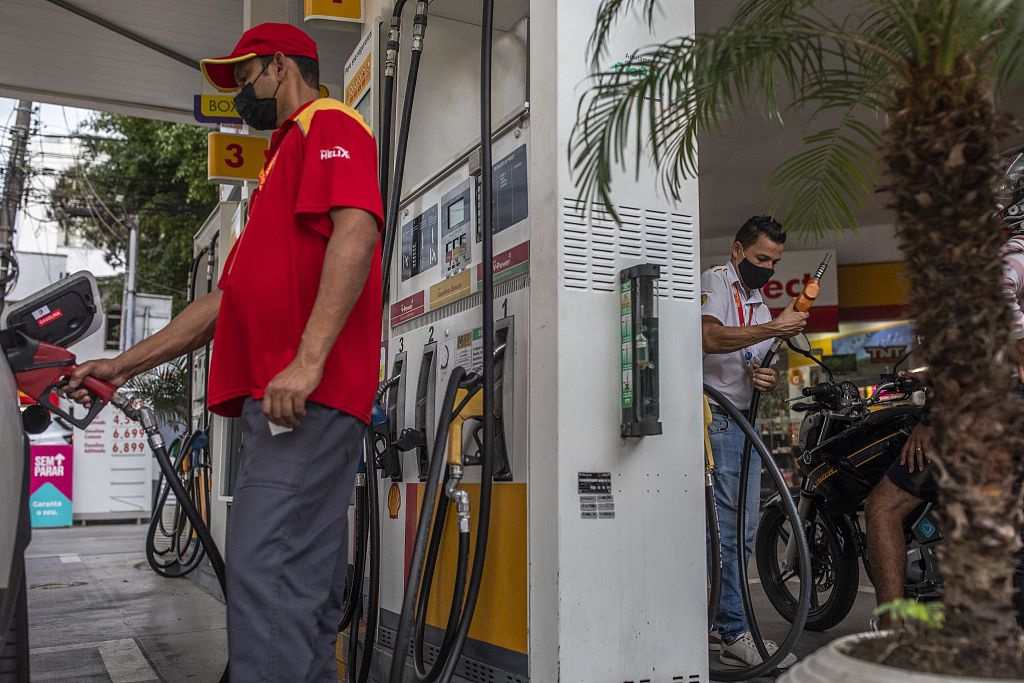
A person photographs fuel prices at a Shell gas station at Fairfax and Olympic Blvd in Los Angeles, California, U.S., March 8, 2022. /VCG
A person photographs fuel prices at a Shell gas station at Fairfax and Olympic Blvd in Los Angeles, California, U.S., March 8, 2022. /VCG
Editor's Note: Freddie Reidy is a freelance writer based in London. He studied history and history of art at the University of Kent, Canterbury, specializing in Russian history and international politics. The article reflects the author's opinions and not necessarily the views of CGTN.
The crisis in Ukraine has curtailed the use of Russian oil and gas, causing a dramatic constraint in supply. This has led to stratospheric price hikes, which nations are rallying to contend with.
As a response, where possible, many nations have returned to more expensive domestic sources of gas and oil or cheaper alternatives such as coal. There is a very real possibility that the climate commitments made in Glasgow at the United Nations' Climate Change Conference (COP26) are now in danger.
Governments across the globe are now caught in a catch-22. Pursuing the necessary aggressive climate commitments agreed at COP26 requires vast sums of capital, and though British Prime Minister Boris Johnson was keen at the time to pursue the economic benefits of such investments, it is extremely challenging to continue to invest vast sums into green initiatives, while rising inflation – as a result of increased energy prices and other domestic agendas – must be cut to maintain the level of financing required.
In the long term, Johnson is right and there will be economic benefits, but these will not be felt for years to come and do not serve as a "quick fix" to an immediate crisis which is bringing real-time consequences to households and businesses across the globe.
In purely economic terms, the response cannot be to jettison "the green agenda," as the long-term economic consequences of unabated rising global temperatures dwarf the current market challenges, however serious they may appear today.
On the political level, this is a challenging tightrope to tread as many leaders face several election cycles before the fruits of renewable energy become apparent.
Speaking at the Economist Climate Summit, UN Secretary General Antonio Guterres cautioned, "Countries could become so consumed by the immediate fossil fuel supply gap that they neglect or knee-cap policies to cut fossil fuel use."

A worker refuels a vehicle at a Shell gas station in Sao Paulo, Brazil, March 10, 2022. /VCG
A worker refuels a vehicle at a Shell gas station in Sao Paulo, Brazil, March 10, 2022. /VCG
The conflict in Ukraine is by no means the only event to expose vulnerabilities in energy security. After a massive 7.4-magnitude earthquake in Japan last week, the country now faces a major energy shortfall as six thermal power stations were impacted. "At this rate, we are coming closer to a state where we will have to conduct power outages similar to those that took place after the quake (in 2011)," said Japanese Trade Minister Koichi Hagiuda.
What is the solution? How can we achieve the climate commitments made without causing severe economic hardship?
Sadly, the steps to avoid are clearer than the steps toward a solution. For nations such as the United Kingdom, a return to indigenous sources of hydrocarbons in the North Sea may appear tempting, but as Peter Cameron, director of the Centre for Energy, Petroleum and Mineral Law and Policy at the University of Dundee, told Financial Times, "People don't seem to understand this is a long way from being like Saudi Arabia," adding that "The North Sea… is not the answer to the kind of problem that Johnson has got; if anything, it might give a sense of false hope."
Indeed, few new drilling rights have been issued for the North Sea in recent years, meaning it would take the best part of a decade to bring oil or gas on stream. But there is then the environmental impact of such a move weighed against a similar investment in renewable energy while the lead times for alternatives such as new nuclear facilities can be even longer.
National governments, therefore, have little choice but to use the levers of taxation policy to ease the price of fuel and control inflation in the short term.
This must be supported by increased investment in renewable energy and streamlined regulation to ensure new energy sources can insulate the global economy from the next crisis and limit the impact of climate change.
In the spirit of COP26, there must also be a greater global commitment to sharing knowledge about energy innovation and supporting bipartisan endeavors.
As such, in the future, projects must also be protected from becoming pawns in a trade war, such as TerraPower's ground-breaking reactor test with the China National Nuclear Corporation which got set back five years during the Trump era.
If climate change was set in motion by short-term thinking around the use of hydrocarbons, we cannot be lured into the trap of again pursuing short-term solutions to what we know is long-term weakness in energy security.
(If you want to contribute and have specific expertise, please contact us at opinions@cgtn.com. Follow @thouse_opinions on Twitter to discover the latest commentaries in the CGTN Opinion Section.)

